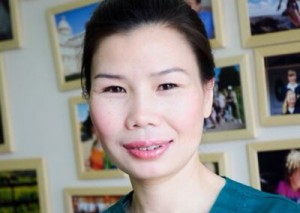China’s Tooth Fairy
THU, MAY 5 – WED, MAY 18 AGENDA 23
Tell us about the differences between operating a dental practice in China compared to in the United States.
 Outside of China, all you have to do is to pass the dental exam in order to start practicing and to get patients to trust you. In addition, the govern- ment will support you in finding patients. In China, there are a lot more government regulations that determine where we can set up our practice, etc. In addition, there hasn’t been a long history of private dental practice here, so Chinese clients don’t take clinics like mine as seriously.
Outside of China, all you have to do is to pass the dental exam in order to start practicing and to get patients to trust you. In addition, the govern- ment will support you in finding patients. In China, there are a lot more government regulations that determine where we can set up our practice, etc. In addition, there hasn’t been a long history of private dental practice here, so Chinese clients don’t take clinics like mine as seriously.
When do Chinese people typically go to the dentist?
Usually when their teeth hurt! [Laughs] It’s rarer for Chinese people to go to the dentist for regular cleanings. In general, with house- holds that have a higher standard of living, many more will go and see a dentist regularly. On the other hand, richer people can be too busy, so they don’t have time or the motivation to come over often. So the most important motivation for visiting the dentist lies with them caring about the health of their teeth and mouth. In China, it’s not very expensive to go and see the dentist; we don’t take a lot of money for any procedure. So ordi- nary people can definitely afford to come and see us, especially if they have insurance. And when they do come to us for the first time, we educate them on how important it is to come to us when there isn’t an emergency.
“People are willing to pay RMB 1,000 for a plastic surgery procedure, but they think that RMB 200 is expensive for a dental checkup”
Why are dental fees so inexpensive here?
Well, for example, there is a lot of demand for cosmetic surgery. People are willing to pay RMB 1,000 for a plastic surgery procedure, whereas they think that RMB 200 is expensive for a dental checkup. So it’s not a question of if they can pay, it’s a question of whether they are willing to pay. If one day they come and recognize that getting their teeth checked is more important, than the demand will go up.
And what are your most popular procedures?
The procedures we perform the most involve cleanings or installing crowns. Our strength is cosmetic dentistry, though, which is getting more and more popular. Ninety percent of our customers are foreigners, and they love teeth whitening. Actually, in terms of cosmetic dentistry, most of our customers are men, which is really funny. Most of them probably think that girls have so many opportuni- ties for getting beauty treatments done, and that cosmetic dentistry is their best opportunity to do the same.
Why so many foreign customers?
My foreign customer base came about very naturally. I started out in Shenzhen, and was always meeting people from Hong Kong, Taiwan, and other countries. So our language and cultural dispari- ties weren’t that big. These cus- tomers who came also found it comfortable to patronize a private clinic, and found our service to be comfortable. And even though we mostly see foreign patients, we still have Chinese prices. When I started, most of my patients were already my friends, so I didn’t want them to think that I was charg- ing them a different price than I would charge a Chinese person. Because of this, as time went on, these initial patients kept telling their friends about Joinway Dental. We built our customer base on word of mouth.
Can you name some of the challenges facing the Chinese dental industry?
In Beijing, there is a lot of competition within our in- dustry, but even though that’s true, we shouldn’t prioritize price over quality. I think each dentist should make sure that the quality of their work is high, when dealing with patients. Otherwise, it’s unfair to our patients, and it will affect our mar- ket. It doesn’t matter if you work in a hospital or if you’ve opened your own practice; our number one pri- ority is to help people, to give them the most accurate information and tools on how to care for their teeth. Our number one priority should be making society better.
What should expats keep in mind when looking for a new dentist?
I have heard of a lot of problems with people seeking out new dentists, especially foreigners who go to Chinese dentists and feel like they didn’t get what they paid for. So my first suggestion would be to go to a dentist that your friend has recommended. Secondly, it’s important that you find a dentist that speaks English or your native language really well. Thirdly, it doesn’t matter if the dentist speaks English or not, you should require that they sign an agreement with you, where you agree on prices, i.e. “For this price, I expectthislevelofcare.”Andwhen you pay, definitely ask for a fapiao. [Laughs] A really good clinic will be happy to provide all of this for you, and you have more recourse for resolving any issue that arises.
Have there been any scandals or unsafe practices that have come out of the dental industry’s growth in China?
Not really, because we had to learn about safety standards and regulations in dental school. In addition, private clinics don’t have as many colleagues or emergency equip- ment, so they have to be more careful than a hospital doctor does. Every industry has its bad parts, but as Chinese people say, “There is no such thing as selling bad medicine – there is only such thing as buying bad medicine.” The only true way to safeguard against risk is to do the research yourself. This is especially impor- tant for foreigners, since they are at a language and cultural disadvantage for asserting their rights, if something goes wrong.
And finally, what do you do to relax?
I run with the Hash House Harriers. We drink a little first and then run in groups around the city. It’s a good way to relax, exercise, and catch up with friends. Few people get drunk, but with some alcohol in your system, you really sweat a lot, which is very relaxing. There’s a lot of pressure that comes with my job; I don’t have a lot of time to get to know Beijing, so Hash lets me tour the whole city, and get to know its hutongs, its food, and its bars.








